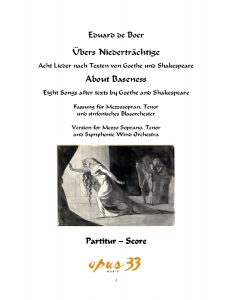 I. Satan ist schon lang’ ins Fabelbuch geschrieben (Satan has long ago been written off to fable-books)
I. Satan ist schon lang’ ins Fabelbuch geschrieben (Satan has long ago been written off to fable-books)
II. Niedertracht (Baseness)
III. Kommt, ihr Geister (Come, you spirits)
IV. Sie hat mich beleidigt
V. Verleumdung (Defamation)
VI. Ausbruch (Outburst)
VII. Nichts ist gewonnen, alles ist dahin (Nought’s had, all’s spent)
VIII. Wanderers Gemütsruhe (The traveller’s peace of mind)
The texts of the songs (German / English) can be viewed and downloaded here.
The topic of this song cycle is baseness, which in the end does nothing but raise some dust – at least according to the great master of literature Goethe in the closing lines of his poem Wanderers Gemütsruhe (The traveller’s peace of mind), with which the cycle ends. There is a little story underlying the choice of texts of Goethe and Shakespeare and their order; a story about evil forces intent on bringing about the downfall of the person that is the protagonist of song number VI and whom we will duly call Miranda.
- The opening song: Satan ist schon lang’ ins Fabelbuch geschrieben (Satan has long ago been written off to fable-books), on texts by Goethe, is a general introduction, as sung by the chorus of a classical Greek drama.
- Niedertracht (Baseness). Iago pretends to be nice to Miranda, while in fact he is only secretly looking for possibilities to bring her down.
- Kommt, ihr Geister (Come, you spirits). Lady Macbeth invokes evil spirits to assist her in her intent.
- Sie hat mich beleidigt (She hath wronged me). Gerald-John Shallow, Esquire, has a very delicate nature which is all too easily offended. Initially sympathizing with Miranda, he decides to join forces with Lady Macbeth and Iago while whimpering about a supposed insult.
- Verleumdung (Defamation). Eventually, the evil forces bring Miranda to court, where their lawyer Lucio presents his list of accusations.
- Ausbruch (Outburst). Gentle Miranda can’t take it any longer. She erupts into anger, in plain but eloquent Shakespearian terms.
- Nichts ist gewonnen, alles ist dahin (Nought’s had, all’s spent). This text is an example that shows the depth of Shakespeare’s insight in universal laws: a desired result never brings satisfaction, when obtained by ill-gotten means.
- Wanderers Gemütsruhe (The traveller’s peace of mind). The Greek chorus closes the cycle, again with words of a general nature by Goethe.
The musical themes of the songs have been derived from medieval melodies to songs texts from the 13th century Codex Buranus, mostly in a way similar to how I used them in my choral song cycle Cantica Aviditatis (Songs of Greed).
This song cycle is as it were a prequel to my instrumental composition Via ad Veniam (The Way to Forgiveness), with which it shares the same opus number and the starting point of freely using melodies from the medieval Carmina Burana.
Youtube (soundfile):